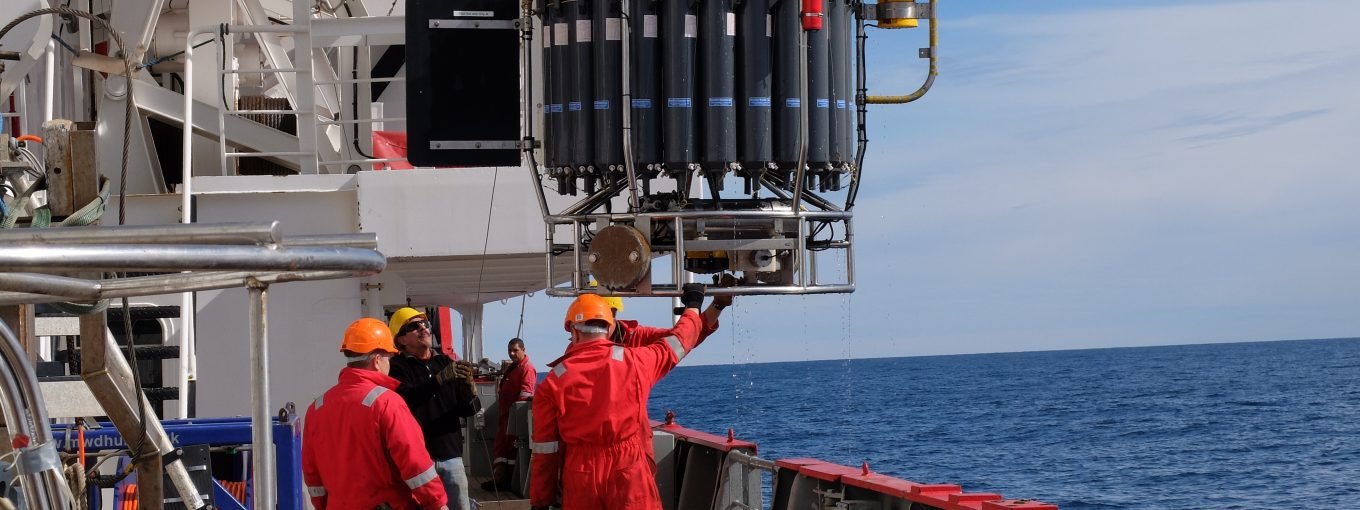The Arctic is responding in unknown ways to profound changes in the physical environment as well as to multiple natural and anthropogenic events that place stress on Arctic ecosystems. The scale of the challenges facing the Arctic is immense and is further compounded by the rapid rate of change.
To address the uncertainties generated in the Arctic Ocean by climate change, NERC is investing £16 million in a research programme called “Changing Arctic Ocean: Implications for marine biology and biogeochemistry.” The programme will run over a 5 year period, from 2017 to 2022. The over-arching goal of this programme is:
“To understand how change in the physical environment (ice and ocean) will affect the large-scale ecosystem structure and biogeochemical functioning of the Arctic Ocean, the potential major impacts and provide projections for future ecosystem services.”
The changes happening in the Arctic Ocean are complex and inter-related. The Changing Arctic Ocean (CAO) Programme aims to understand these in a quantifiable way, and has two over-arching Research Challenges to achieve this.
The decision to fund the CAO Programme is both political and scientific. Several documents describe the rationale for this Programme.
The research projects in the Programme have been selected by Announcements of Opportunity that outline two separate funding calls for scientific proposals.
The Changing Arctic Ocean is the second large research Programme funded by NERC. The first was the Arctic Research Programme that ran from 2010 to 2015.
Projects
The Changing Arctic Ocean programme started in February 2017 with four large projects (Arctic PRIZE, ARISE, ChAOS, DIAPOD) funded by NERC. A further 12 projects joined the programme in July 2018, co-funded by NERC and the German Federal Ministry of Education and Research. Each one investigates different aspects of the Changing Arctic Ocean. Combined, the projects involve 32 research institutions and organisations in the UK and Germany, and more than 200 scientists.
People
The people involved in the CAO Programme are scientists, technicians, and PhD students in the various projects, data managers to take care of the large quantities of data generated, the Science Coordinator, and the Programme Advisory Group, who advise on the strategic direction of the Programme.
Science Outputs
As the CAO Programme progresses, the science generated will be published in peer-reviewed journals and presented at national and international conferences. The Programme also holds its own CAO events that bring together scientists in the Programme and collaborators to discuss and exchange ideas.
Media Attention
Environmental change in the Arctic Ocean is attracting increasing media attention, reflected by the coverage the CAO Programme receives. Press releases are also published by the CAO Programme on a regular basis to highlight key events and important science emerging from the CAO Programme.
Outreach
The outreach activities are designed to communicate the Programme’s science to the public. These activities are carried out by the project scientists, technicians and PhD students. They range from public talks to the production of educational materials for school children, and online blogs. More details can be found in the Calendar of Events.
Arctic Stakeholders
The global importance of Arctic research means interaction with national and international stakeholders is essential. The projects in the CAO Programme communicate the most important scientific findings and outcomes from their work to these stakeholders. This will ultimately benefit evidence-based decision and policy making.
Contact Us
The contact information page provides details for various types of enquiry: general, scientific, requests for data, outreach activities. Members of the Press searching for more information about the Arctic are also welcome to contact us. Specific contact information about each of the UK and German research institutions can also be found here.
Arctic Links
A vast array of Arctic internet resources is available. Here we list those with direct links to the Changing Arctic Ocean Programme.








